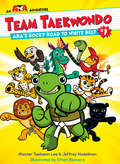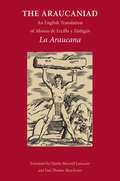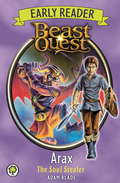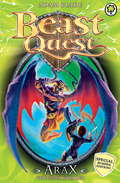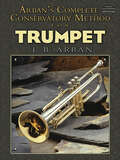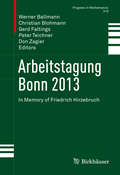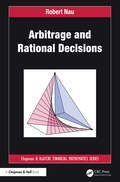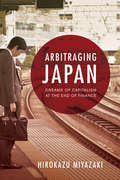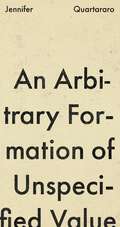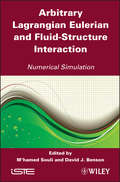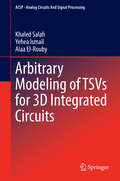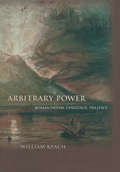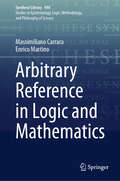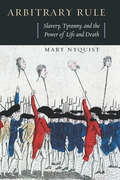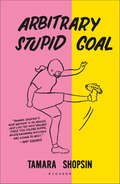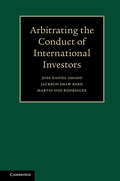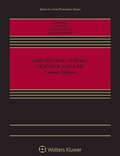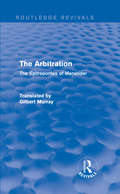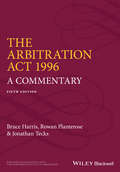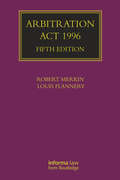- Table View
- List View
Ara's Rocky Road to White Belt (Team Taekwondo #1)
by Master Taekwon Lee Jeffrey Nodelman Ethen Beavers<P>Ara is the odd turtle out in his family, preferring his rock collection to new or wild adventures—until he meets Baeoh, a confident tiger who practices martial arts. <p>Unsure if he has what it takes to join Baeoh’s taekwondo team, Ara must learn how to come out of his shell, persist through failure, and accept the help of his new friends to complete the Tiger Fitness Challenge. <p>The Team Taekwondo series combines the appeal of graphic novels and martial arts to deliver action-filled, character-building stories. <p>Each book also includes one free lesson at any participating licensed ATA Martial Arts location. <P><P> <i>Advisory: Bookshare has learned that this book offers only partial accessibility. We have kept it in the collection because it is useful for some of our members. Benetech is actively working on projects to improve accessibility issues such as these.</i>
The Araucaniad
by Alonso de Ercilla Y Zuniga Charles Maxwell Lancaster Paul Thomas ManchesterNow back in print! The first English translation of this epic masterpiece of Chilean poetry.
The Araucaniad
by Alonso De ZunigaNow back in print! The first English translation of this epic masterpiece of Chilean poetry.
Arauco (A): Forward Integration or Horizontal Expansion?
by Ramon Casadesus-Masanell Jordan Mitchell Jorge TarzijanCelulosa Arauco is a major Chilean producer of market pulp and wood products. Owning over 1.2 million hectares of forest in Chile, Argentina, and Uruguay, the company's key advantage is the ideal growing conditions in which the company's forests are located. As of early 2004, Arauco is the third largest producer of market pulp (pulp sold on the open market) and is considering increasing its capacity, tying it with Brazilian competitor Aracruz as the world's largest producer. The first phase of the project has been approved by the board of directors and includes a sawmill, plywood mill, and energy complex valued at $120 million. Now, Alejandro Perez, Arauco's president and CEO, is seeking approval for the second phase of the project, which would include the company's sixth market pulp plant at a cost of $1.2 billion. Perez's concerns about the volatility of market prices for the past three years led the company to diversify into wood products like panels, medium-density fiberboard, and other remanufactured wood products. These divisions are highly successful and currently account for approximately 50% of Arauco's revenues. Perez is debating whether the company and its shareholders would be better served by a forward integration into the paper business instead of increasing the company's capacity in market pulp.
Aravind Eye Hospital, Madurai, India: In Service for Sight
by V. Kasturi RanganStarting as a modest 20-bed hospital, Aravind had grown into a 1,400-bed hospital complex by 1992. It had by then screened 3.65 million patients and performed 335,000 cataract surgeries, nearly 70% of them free of cost for the poorest of India's blind population. Aravind's founder, Dr. Venkataswamy, now 74 years old, had a goal to spread the Aravind model to every nook and corner of India, Asia, and Africa. The case sets the stage for developing such a plan of action.
Arax the Soul Stealer (Beast Quest Early Reader #3)
by Adam BladeArax the Soul Stealer has snatched away good Wizard Aduro's spirit, leaving the kingdom exposed to the evil of Wizard Malvel. To save Aduro, Tom tracks Arax to his cave - but the terrible Beast wants Tom's soul, too...Beast Quest Early Readers are perfect for children learning to read and for families to enjoy together, with text vetted by a literacy expert and bright new colour illustrations.Look out for Beast Quest Early Reader 4: Creta the Winged Terror in November!
Arax the Soul Stealer: Special (Beast Quest #3)
by Adam BladeArax the Soul Stealer has snatched away good Wizard Aduro's spirit, leaving the kingdom exposed to the evil of Wizard Malvel. To save Aduro, Tom tracks Arax to his cave - but the terrible Beast wants Tom's soul, too...Don't missNIXA THE DEATH-BRINGER - EQUINUS THE SPIRIT HORSE - RASHOUK THE CAVE TROLL - LUNA THE MOON WOLF - BLAZE THE ICE DRAGON - STEALTH THE GHOST PANTHER
Arban's Complete Conservatory Method for Trumpet (Dover Books on Music)
by Jb Arban"The trumpeter's bible" for over 150 years, this complete pedagogical method contains hundreds of exercises, beginning with basics and progressing to advanced compositions, including the author's famous arrangement of Carnival in Venice. J. B. Arban discusses every aspect of playing — including articulation, tonguing, slurs, tone, and range — sharing the knowledge he acquired from many years of experience as a teacher and performer. He offers an appreciation of all the instrument's inherent difficulties as well as instructive points that touch upon all possible musical questions.The Paris Conservatory's Committee on Music Study noted, "This work is rich in instructive advice, is based upon the best of fundamental principles, and omits not a single instructive point which might be needed for the development and gradual technical perfection of a player." This edition features an Introduction and expert commentary by an instructor well versed in the Arban Method.
Arbeitstagung Bonn 2013: In Memory of Friedrich Hirzebruch (Progress in Mathematics #319)
by Gerd Faltings Werner Ballmann Christian Blohmann Peter Teichner Don ZagierThis volume contains selected papers authored by speakers and participants of the 2013 Arbeitstagung, held at the Max Planck Institute for Mathematics in Bonn, Germany, from May 22-28. The 2013 meeting (and this resulting proceedings) was dedicated to the memory of Friedrich Hirzebruch, who passed away on May 27, 2012. Hirzebruch organized the first Arbeitstagung in 1957 with a unique concept that would become its most distinctive feature: the program was not determined beforehand by the organizers, but during the meeting by all participants in an open discussion. This ensured that the talks would be on the latest developments in mathematics and that many important results were presented at the conference for the first time. Written by leading mathematicians, the papers in this volume cover various topics from algebraic geometry, topology, analysis, operator theory, and representation theory and display the breadth and depth of pure mathematics that has always been characteristic of the Arbeitstagung.
Arbitrage: Strategies for Global Value Creation
by Pankaj GhemawatThis chapter focuses on arbitrage strategies that exploit selected differences across countries instead of treating them all as constraints, examining economic and labor arbitrage in particular. This chapter was originally published as chapter 6 of "Redefining Global Strategy: Crossing Borders in a World Where Differences Still Matter."
Arbitrage and Rational Decisions (Chapman and Hall/CRC Financial Mathematics Series)
by Robert NauThis unique book offers a new approach to the modeling of rational decision-making under conditions of uncertainty and strategic and competition interactions among agents. It presents a unified theory in which the most basic axiom of rationality is the principle of no-arbitrage, namely that neither an individual decision maker nor a small group of strategic competitors nor a large group of market participants should behave in such a way as to provide a riskless profit opportunity to an outside observer.Both those who work in the finance area and those who work in decision theory more broadly will be interested to find that basic tools from finance (arbitrage pricing and risk-neutral probabilities) have broader applications, including the modeling of subjective probability and expected utility, incomplete preferences, inseparable probabilities and utilities, nonexpected utility, ambiguity, noncooperative games, and social choice. Key results in all these areas can be derived from a single principle and essentially the same mathematics.A number of insights emerge from this approach. One is that the presence of money (or not) is hugely important for modeling decision behavior in quantitative terms and for dealing with issues of common knowledge of numerical parameters of a situation. Another is that beliefs (probabilities) do not need to be uniquely separated from tastes (utilities) for the modeling of phenomena such as aversion to uncertainty and ambiguity. Another over-arching issue is that probabilities and utilities are always to some extent indeterminate, but this does not create problems for the arbitrage-based theories.One of the book’s key contributions is to show how noncooperative game theory can be directly unified with Bayesian decision theory and financial market theory without introducing separate assumptions about strategic rationality. This leads to the conclusion that correlated equilibrium rather than Nash equilibrium is the fundamental solution concept.The book is written to be accessible to advanced undergraduates and graduate students, researchers in the field, and professionals.
Arbitrage in the Government Bond Market?
by Michael E. Edleson Peter TufanoDocuments a pricing anomaly in the large and liquid treasury bond market. The prices of callable treasury bonds seem to be inconsistent with the prices of noncallable treasuries and an arbitrage opportunity appears to exist. Permits instructors to introduce the treasury market, the concept of creating synthetic instruments, principles of arbitrage, and institutional frictions in the bond markets.
Arbitraging Japan: Dreams of Capitalism at the End of Finance
by Hirokazu MiyazakiFor many financial market professionals worldwide, the era of high finance is over. The times in which bankers and financiers were the primary movers and shakers of both economy and society have come to an abrupt halt. What has this shift meant for the future of capitalism? What has it meant for the future of the financial industry? What about the lives and careers of financial operators who were once driven by utopian visions of economic, social, and personal transformation? And what does it mean for critics of capitalism who have long predicted the end of financial institutions? Hirokazu Miyazaki answers these questions through a close examination of the careers and intellectual trajectories of a group of pioneering derivatives traders in Japan during the 1990s and 2000s.
An Arbitrary Formation of Unspecified Value
by Jennifer QuartararoAn Arbitrary Formation of Unspecified Value is a fragmented book-length essay in which we see the city of Detroit through two distinct seasons: the summer Quartararo worked with a letterpress artist in a former veal locker, and the winter she lived on a dead end street slated for possible removal next to a defunct highway overpass. We see the city from the seat of her bicycle, from the #42 bus, and for miles on foot as she meditates on the erasure of memories, the impermanence of bodies, and the disintegration of structures. Quartararo’s Detroit teems with life as she explores the ways people are both shaped by, and take shape of, landscapes.
Arbitrary Lagrangian Eulerian and Fluid-Structure Interaction: Numerical Simulation (Wiley-iste Ser.)
by M'Hamed Souli David J. BensonThis book provides the fundamental basics for solving fluid structure interaction problems, and describes different algorithms and numerical methods used to solve problems where fluid and structure can be weakly or strongly coupled. These approaches are illustrated with examples arising from industrial or academic applications. Each of these approaches has its own performance and limitations. Given the book’s comprehensive coverage, engineers, graduate students and researchers involved in the simulation of practical fluid structure interaction problems will find this book extremely useful.
Arbitrary Modeling of TSVs for 3D Integrated Circuits (Analog Circuits and Signal Processing)
by Khaled Salah Yehea Ismail Alaa El-RoubyThis book presents a wide-band and technology independent, SPICE-compatible RLC model for through-silicon vias (TSVs) in 3D integrated circuits. This model accounts for a variety of effects, including skin effect, depletion capacitance and nearby contact effects. Readers will benefit from in-depth coverage of concepts and technology such as 3D integration, Macro modeling, dimensional analysis and compact modeling, as well as closed form equations for the through silicon via parasitics. Concepts covered are demonstrated by using TSVs in applications such as a spiral inductor and inductive-based communication system and bandpass filtering.
Arbitrary Power: Romanticism, Language, Politics
by William KeachThis book explores previously unexamined links between the arbitrary as articulated in linguistic theories on the one hand, and in political discourse about power on the other. In particular, Willam Keach shows how Enlightenment conceptions of the arbitrary were contested and extended in British Romantic writing. In doing so, he offers a new paradigm for understanding the recurrent problem of verbal representation in Romantic writing and the disputes over stylistic performance during this period. With clarity and force, Keach reads these phenomena in relation to a rapidly shifting literary marketplace and to the social pressures in Britain generated by the French Revolution, the Napoleonic Wars, and the class antagonisms that culminated in the Peterloo Massacre. The question of what it means to think of language or politics as arbitrary persists through postmodern thinking, and this book advances an unfinished dialogue between Romantic culture and the critical techniques we currently use to analyze it. Keach's intertwined linguistic and political account of arbitrary power culminates in a detailed textual analysis of the language of revolutionary violence. Including substantial sections on Blake, Wollstonecraft, Wordsworth, Coleridge, Byron, P. B. Shelley, Keats, and Anna Jameson, Arbitrary Power will engage not only students and scholars of eighteenth- and nineteenth-century literature but also those interested in critical and linguistic theory and in social and political history.
Arbitrary Reference in Logic and Mathematics (Synthese Library #490)
by Enrico Martino Massimiliano CarraraThis book develops a new approach to plural arbitrary reference and examines mereology, including considering four theses on the alleged innocence of mereology. The authors have advanced the notion of plural arbitrary reference in terms of idealized plural acts of choice, performed by a suitable team of agents. In the first part of the book, readers will discover a revision of Boolosʼ interpretation of second order logic in terms of plural quantification and a sketched structuralist reconstruction of second-order arithmetic based on the axiom of infinite, a la Dedekind, as the unique non-logical axiom. The work goes on to analyse the pros and cons of the new interpretation, also with respect to Linneboʼs objections to the thesis that second order logic is genuine logic. A theory of concepts that can be labelled as a theory of logical concepts is expounded. In the second part of the book, the authors consider grounding megethology on plural arbitrary reference and argue that the arguments for the ontological innocence of mereology are not conclusive and that – for a certain use of mereology – a thesis of innocence, similar to that of plural arbitrary reference, is defensible. The work proposes a virtual theory of mereology in which the role of individuals is played by plural choices of atoms. This considered work will appeal to scholars from branches of analytic philosophy, logic and the philosophy of mathematics in particular.
Arbitrary Rule: Slavery, Tyranny, and the Power of Life and Death
by Mary NyquistSlavery appears as a figurative construct during the English revolution of the mid-seventeenth century, and again in the American and French revolutions, when radicals represent their treatment as a form of political slavery. What, if anything, does figurative, political slavery have to do with transatlantic slavery? In Arbitrary Rule, Mary Nyquist explores connections between political and chattel slavery by excavating the tradition of Western political thought that justifies actively opposing tyranny. She argues that as powerful rhetorical and conceptual constructs, Greco-Roman political liberty and slavery reemerge at the time of early modern Eurocolonial expansion; they help to create racialized "free" national identities and their "unfree" counterparts in non-European nations represented as inhabiting an earlier, privative age. Arbitrary Rule is the first book to tackle political slavery's discursive complexity, engaging Eurocolonialism, political philosophy, and literary studies, areas of study too often kept apart. Nyquist proceeds through analyses not only of texts that are canonical in political thought--by Aristotle, Cicero, Hobbes, and Locke--but also of literary works by Euripides, Buchanan, Vondel, Montaigne, and Milton, together with a variety of colonialist and political writings, with special emphasis on tracts written during the English revolution. She illustrates how "antityranny discourse," which originated in democratic Athens, was adopted by republican Rome, and revived in early modern Western Europe, provided members of a "free" community with a means of protesting a threatened reduction of privileges or of consolidating a collective, political identity. Its semantic complexity, however, also enabled it to legitimize racialized enslavement and imperial expansion. Throughout, Nyquist demonstrates how principles relating to political slavery and tyranny are bound up with a Roman jurisprudential doctrine that sanctions the power of life and death held by the slaveholder over slaves and, by extension, the state, its representatives, or its laws over its citizenry.
Arbitrary Stupid Goal
by Tamara ShopsinOne of The New Yorker's "Books We Loved in 2017"“Arbitrary Stupid Goal is a completely riveting world—when I looked up from its pages regular life seemed boring and safe and modern like one big iPhone. This book captures not just a lost New York but a whole lost way of life.” —Miranda JulyIn Arbitrary Stupid Goal, Tamara Shopsin takes the reader on a pointillist time-travel trip to the Greenwich Village of her bohemian childhood, a funky, tight-knit small town in the big city, long before Sex and the City tours and luxury condos. The center of Tamara’s universe is Shopsin’s, her family’s legendary greasy spoon, aka “The Store,” run by her inimitable dad, Kenny—a loquacious, contrary, huge-hearted man who, aside from dishing up New York’s best egg salad on rye, is Village sheriff, philosopher, and fixer all at once. All comers find a place at Shopsin’s table and feast on Kenny’s tall tales and trenchant advice along with the incomparable chili con carne. Filled with clever illustrations and witty, nostalgic photographs and graphics, and told in a sly, elliptical narrative that is both hilarious and endearing, Arbitrary Stupid Goal is an offbeat memory-book mosaic about the secrets of living an unconventional life, which is becoming a forgotten art.
Arbitrating the Conduct of International Investors
by Jose Daniel Amado Jackson Shaw Kern Martin Doe RodriguezInvestment arbitration has emerged from modest beginnings and matured into an established presence in international law. However, in recent years it has drifted from the reciprocal vision of its founders. This volume serves as a comprehensive guide for those who wish to reform international investment law from within, seeking a return to the mutuality of access that is in arbitration's essence. A detailed toolset is provided for enhancing the access of host States and their nationals to formal resolution mechanisms in foreign investment disputes. It concludes by offering model texts to achieve greater reciprocity and access to justice in the settlement of disputes arising from international investment initiatives. The book will appeal to all those interested in the future of international investment law, including an international audience of scholars, government officials, private sector actors, and private citizens alike, and including diverse constituencies, communities, and collectives of host State nationals.
Arbitration: Theory, Practice and Law
by Jay Folberg Dwight Golann Thomas J. Stipanowich Lisa A. KloppenbergThis custom title contains selections from: <p><p> Resolving Disputes: Theory, Practice, and Law, Third Edition (9781454838746); Jay Folberg, Dwight Golann, Thomas J. Stipanowich, Lisa A. Kloppenberg
The Arbitration: The Epitrepontes of Menander (Routledge Revivals)
by Gilbert MurrayGilbert Murray translated and made available to modern readers The Epitrepontes of Menander or The Arbitration for the first time in 1945. The Arbitration is among the most frequently quoted and most famous of Menander’s plays and – being less farcical than others - belongs to his mature style. With an interesting and informative introduction, this translation will be of value to any student of Classics and Ancient Greek drama.
The Arbitration Act 1996
by Bruce Harris Jonathan Tecks Rowan PlanteroseThe most readable, useful, practical and user-friendly guide to the Arbitration Act 1996.The Arbitration Act 1996 is a section by section commentary on the Act, which Lord Bingham described as "intensely practical and admirably user-friendly" when it was first published. The fifth edition has been updated by considering in excess of 300 new cases decided since publication of the 4th edition. In addition there have been some significant changes to the Model Law since publication of the previous edition, (which take it into areas where UK arbitration does not go), and these changes are documented, updated and commented upon. In previous editions, the authors have limited themselves to mentioning states conclusively declared to be parties to the New York Convention by Order in Council. This tends to follow some way behind the current position, however, so a more comprehensive coverage of states which are parties to the New York Convention is included. The result is a thorough update, providing the most readable and useful guide to the Act. provides a section by section commentary on the Act and covers all the key casespublished in conjunction with the Chartered Institute of Arbitrators and used by them as a recommended training textthe bestseller of the four original guides to the 1996 Actwritten by three practising arbitrators, two of whom are also practising barristers'There should not be a practitioner who does not have a copy...highly recommended.' - Arbitration
Arbitration Act 1996: An Annotated Guide (Lloyd's Arbitration Law Library)
by Robert Merkin Louis FlanneryThis book is an essential resource for any legal practitioner involved in any aspect of English arbitration law. It provides a thorough annotation of the Arbitration Act 1996, and contains comprehensive explanations of developments in the relevant case law to each section of the Act.Since the fourth edition of this book, the English courts have decided many important new cases on virtually every aspect of arbitration law. The most important developments relate to: The growth of anti-arbitration injunctions; The use of freezing injunctions against third party assets and the availability of anti-suit injunctions in EU proceedings; The definition of seat, the appointment of arbitrators, choice of applicable law, jurisdiction, the form of the award and the slip rule; Enforcement of foreign awards, and challenges to domestic awards by way of jurisdictional attacks, serious irregularity or error of law In this 5th edition, the notes to each section contain helpful sub-headings and a new Appendix will contain a fully annotated version of CPR Part 62 and the Practice Direction. The book will also be useful for academics and university students of law at all levels seeking an understanding of the 1996 Act, including those on the Legal Practice Course.
